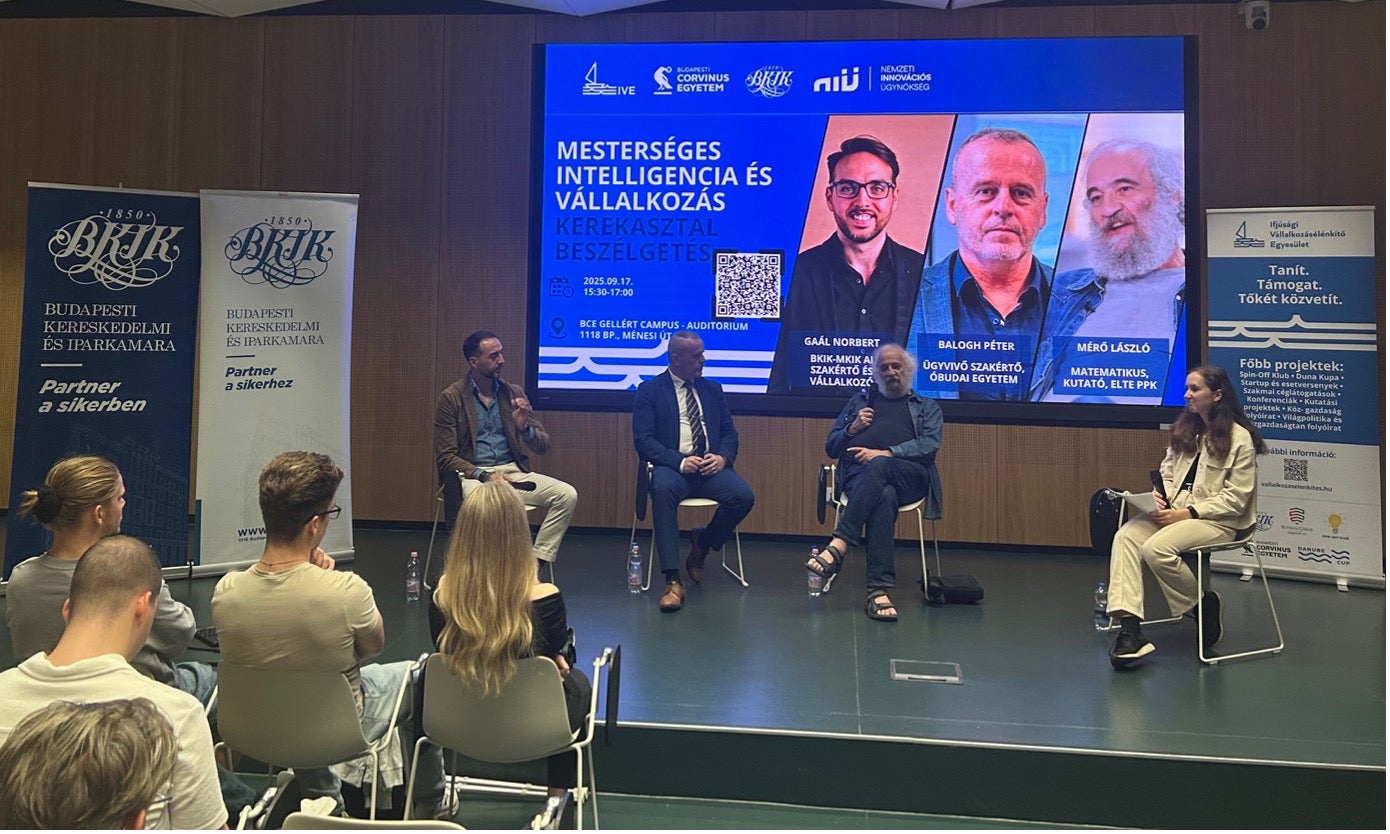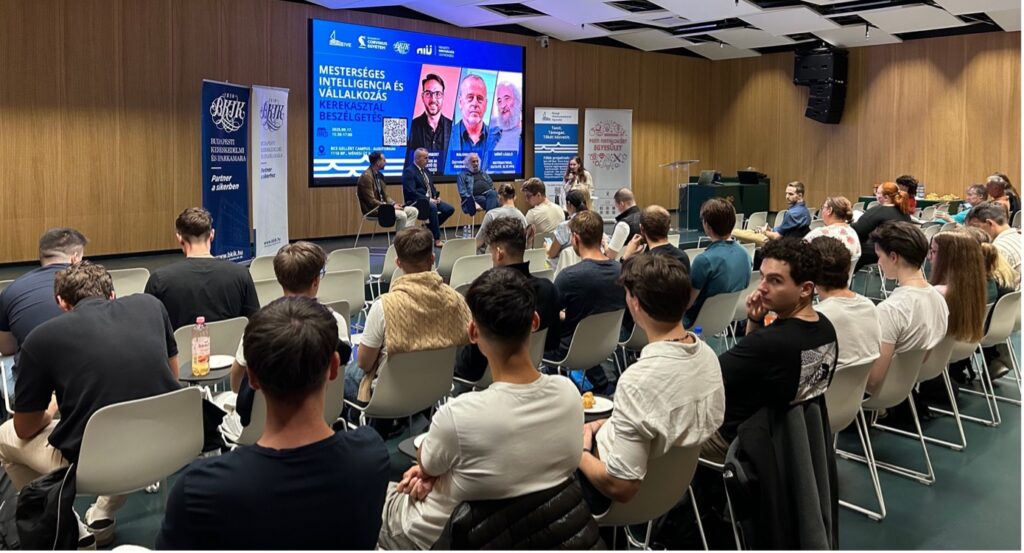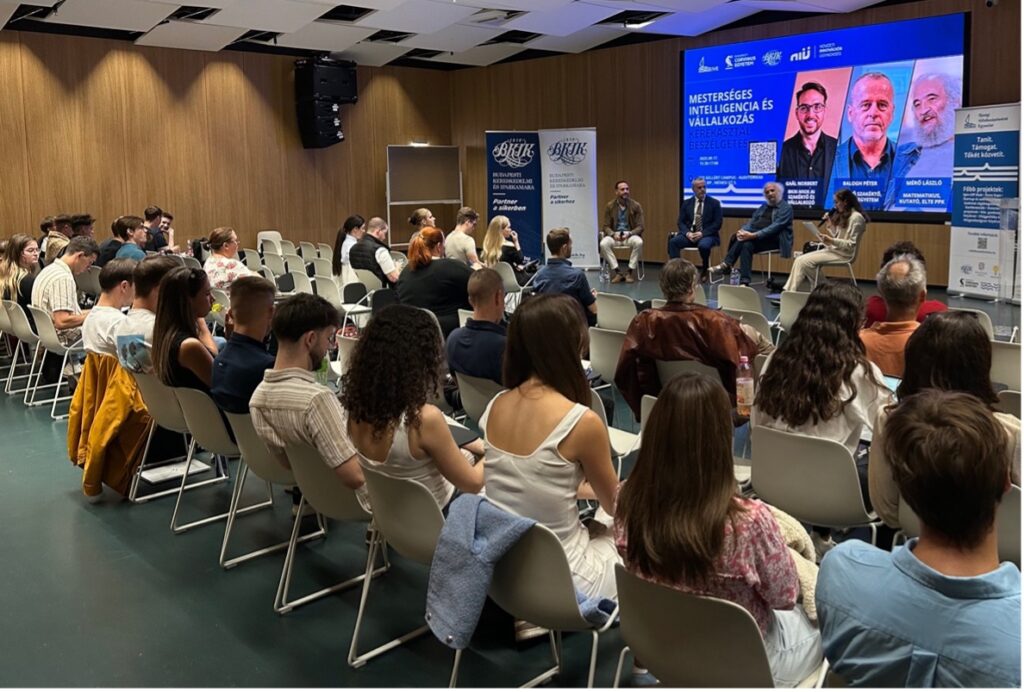AI and Entrepreneurship Roundtable

As part of the Spin-off Club‘s autumn program series, a roundtable discussion on “Artificial Intelligence and Entrepreneurship” was held at the Corvinus Gellért Campus.
The guest speakers at the roundtable were Norbert Gaál, CEO of First Principle Innovation Zrt., AI expert and business innovation strategist; László Mérő, mathematician, psychologist, publicist, and professor at the ELTE Institute of Psychology; and Péter Balogh, who, with decades of military service behind him, is currently an expert at Óbuda University.
In the initial phase of the discussion, the topic was defined through a discourse on the definition of AI and technological intelligence. It is important to note that this is a general-purpose technology that permeates all areas of life and is independent of industry. Norbert Gaál emphasized that such technology has been rare in recent centuries, but we can compare it to the advent of the internal combustion engine, electricity, or the internet. We typically distinguish between three phases of life: infrastructure development, user adaptation, and market sector implementation. Currently, ChatGPT users account for approximately 10% of the global population. László Mérő, who has been involved in artificial intelligence research as a member of SZTAKI since the 1970s, said that we have known the basics of today’s pioneering innovation for nearly 50 years. The challenge in the past was actually how to make a background algorithm millions of times faster.
It is an exciting proposition that AI is now in fact an independent technical discipline that encompasses a number of different applications, and experts select the appropriate AI tool on a problem-specific basis. Artificial intelligence decentralizes access to technology, making it available not only to expert programmers and professionals. The phenomenon of vibe coding is when someone quickly and intuitively creates AI solutions without knowing all the technical details perfectly or following formal development processes.
Reflecting on previous research by MIT, Péter Balogh mentioned that there are six distinct cultural clusters around the world, so it is likely that the cultural environment in which artificial intelligence is developed plays a role in how it is created in different parts of the world. Exploring philosophical aspects, the discussion touched not only on ChatGPT’s empathy, but also on the potential complacency of users and the decline of human creativity and critical thinking. Presumably, our concepts of human intelligence and creativity will also be transformed, and the things that truly make us human will become more valuable as time goes on. A vivid example of this is the possibility of identifying AI-generated content as part of intelligence tests.
In their closing remarks, the participants focused on the prospects for the future. Norbert Gaál emphasized that, based on current trends, by 2027, GPT models will be able to develop independently, even without human intervention and development, which reinforces the importance of cooperation and co-production between artificial intelligence and humans: two dominant species cannot coexist on one planet, so cooperation is not just a possibility, but the goal itself.
The speakers also drew attention to valuable advice for young entrepreneurs, as rapid validation cycles, quick decision-making, and identifying relevant problems are key for future entrepreneurs. Péter Balogh added that decision support and cybersecurity, for example, are areas where AI is constantly creating new challenges and opportunities. The key is to use AI not only as a tool, but also to put it at the service of creative innovation. Caution and ethical use are essential in all areas of application.
If artificial intelligence is capable of learning and developing without human intervention, will our values regarding human creativity and entrepreneurial spirit be transformed, and where will we find our place in a world where AI is becoming an increasingly independent player?
The Youth Enterprise Support Society organised the event as part of the Hungarian Innovation Week program, in partnership with the Budapest Chamber of Commerce and Industry (BKIK). The event was moderated by Dóra Egri and hosted by Dr. Krisztofer Szabó.

